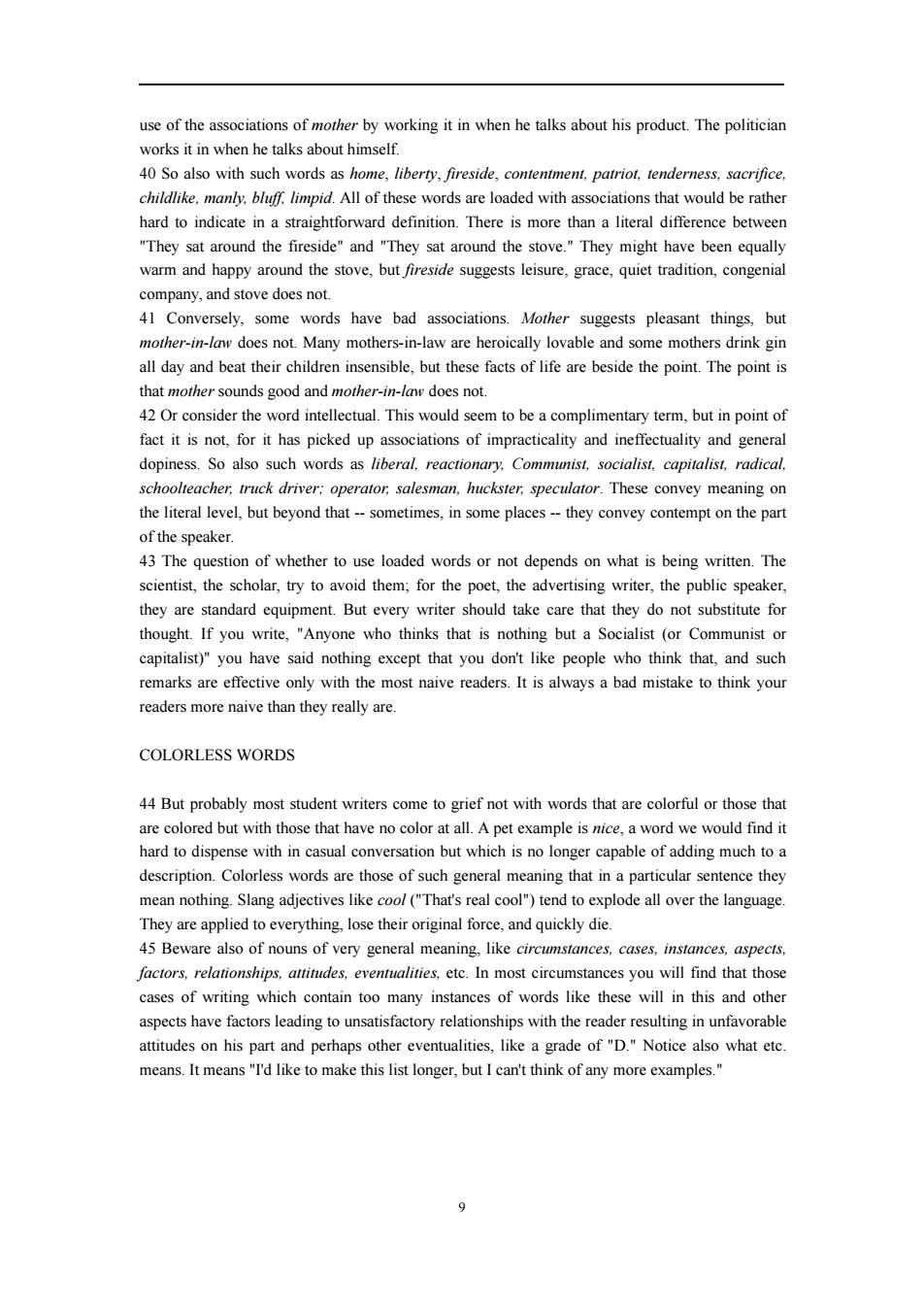正在加载图片...

use of the associations of mother by working it in when he talks about his product.The politician works it in when he talks about himself. 40 So also with such words as home,liberty,fireside,contentment,patriot,tenderness,sacrifice, childlike,manly,bluff.limpid.All of these words are loaded with associations that would be rather hard to indicate in a straightforward definition.There is more than a literal difference between "They sat around the fireside"and "They sat around the stove."They might have been equally warm and happy around the stove,but fireside suggests leisure,grace,quiet tradition,congenial company,and stove does not. 41 Conversely,some words have bad associations.Mother suggests pleasant things,but mother-in-law does not.Many mothers-in-law are heroically lovable and some mothers drink gin all day and beat their children insensible,but these facts of life are beside the point.The point is that mother sounds good and mother-in-law does not. 42 Or consider the word intellectual.This would seem to be a complimentary term,but in point of fact it is not,for it has picked up associations of impracticality and ineffectuality and general dopiness.So also such words as liberal,reactionary,Communist,socialist,capitalist,radical, schoolteacher,truck driver:operator,salesman,huckster,speculator.These convey meaning on the literal level,but beyond that--sometimes,in some places--they convey contempt on the part of the speaker. 43 The question of whether to use loaded words or not depends on what is being written.The scientist,the scholar,try to avoid them;for the poet,the advertising writer,the public speaker, they are standard equipment.But every writer should take care that they do not substitute for thought.If you write,"Anyone who thinks that is nothing but a Socialist (or Communist or capitalist)"you have said nothing except that you don't like people who think that,and such remarks are effective only with the most naive readers.It is always a bad mistake to think your readers more naive than they really are. COLORLESS WORDS 44 But probably most student writers come to grief not with words that are colorful or those that are colored but with those that have no color at all.A pet example is nice,a word we would find it hard to dispense with in casual conversation but which is no longer capable of adding much to a description.Colorless words are those of such general meaning that in a particular sentence they mean nothing.Slang adjectives like cool("That's real cool")tend to explode all over the language. They are applied to everything,lose their original force,and quickly die. 45 Beware also of nouns of very general meaning,like circumstances,cases,instances,aspects, factors,relationships,attitudes,eventualities,etc.In most circumstances you will find that those cases of writing which contain too many instances of words like these will in this and other aspects have factors leading to unsatisfactory relationships with the reader resulting in unfavorable attitudes on his part and perhaps other eventualities,like a grade of"D."Notice also what etc. means.It means"I'd like to make this list longer,but I can't think of any more examples." 99 use of the associations of mother by working it in when he talks about his product. The politician works it in when he talks about himself. 40 So also with such words as home, liberty, fireside, contentment, patriot, tenderness, sacrifice, childlike, manly, bluf , limpid. All of these words are loaded with associations that would be rather hard to indicate in a straightforward definition. There is more than a literal difference between "They sat around the fireside" and "They sat around the stove." They might have been equally warm and happy around the stove, but fireside suggests leisure, grace, quiet tradition, congenial company, and stove does not. 41 Conversely, some words have bad associations. Mother suggests pleasant things, but mother-in-law does not. Many mothers-in-law are heroically lovable and some mothers drink gin all day and beat their children insensible, but these facts of life are beside the point. The point is that mother sounds good and mother-in-law does not. 42 Or consider the word intellectual. This would seem to be a complimentary term, but in point of fact it is not, for it has picked up associations of impracticality and ineffectuality and general dopiness. So also such words as liberal, reactionary, Communist, socialist, capitalist, radical, schoolteacher, truck driver; operator, salesman, huckster, speculator. These convey meaning on the literal level, but beyond that -- sometimes, in some places -- they convey contempt on the part of the speaker. 43 The question of whether to use loaded words or not depends on what is being written. The scientist, the scholar, try to avoid them; for the poet, the advertising writer, the public speaker, they are standard equipment. But every writer should take care that they do not substitute for thought. If you write, "Anyone who thinks that is nothing but a Socialist (or Communist or capitalist)" you have said nothing except that you don't like people who think that, and such remarks are effective only with the most naive readers. It is always a bad mistake to think your readers more naive than they really are. COLORLESS WORDS 44 But probably most student writers come to grief not with words that are colorful or those that are colored but with those that have no color at all. A pet example is nice, a word we would find it hard to dispense with in casual conversation but which is no longer capable of adding much to a description. Colorless words are those of such general meaning that in a particular sentence they mean nothing. Slang adjectives like cool ("That's real cool") tend to explode all over the language. They are applied to everything, lose their original force, and quickly die. 45 Beware also of nouns of very general meaning, like circumstances, cases, instances, aspects, factors, relationships, attitudes, eventualities, etc. In most circumstances you will find that those cases of writing which contain too many instances of words like these will in this and other aspects have factors leading to unsatisfactory relationships with the reader resulting in unfavorable attitudes on his part and perhaps other eventualities, like a grade of "D." Notice also what etc. means. It means "I'd like to make this list longer, but I can't think of any more examples